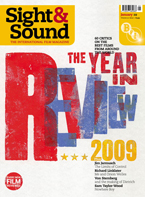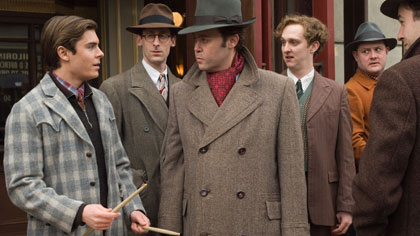Primary navigation

USA-UK 2009

Reviewed by Nick Bradshaw
Our synopses give away the plot in full, including surprise twists.
New York, 1937. On a day trip to Manhattan, 17-year-old schoolboy and acting hopeful Richard meets Gretta, an aspiring playwright, in a music shop; they discuss mutual artistic ambitions. Along the road he finds Orson Welles and entourage unveiling their Mercury Theatre company; Richard bluffs his way into a role in their forthcoming production of Julius Caesar. After Welles speeds off in a chauffer-driven ambulance, Richard is debriefed by Welles' ambitious young assistant Sonja, to the envy of fellow actor Joseph Cotten.
Back in the theatre, Welles rows with producer John Houseman and leading man George Coulouris, and whisks his mistress offstage as his wife arrives. Richard, Cotten and another actor bet on which of them will be the first to sleep with Sonja. On the third day, Richard sees Welles impress the cast of a radio advert with a supposed improvisation - in fact a recitation from The Magnificent Ambersons - then pick up the studio assistant as he leaves. Sonja invites Richard to go dancing with her. Flicking matches, Richard sets off the Mercury's ancient sprinkler system, drenching the venue; he resists confessing. Meeting Gretta in the Metropolitan Museum, he offers to pass her new short story to New Yorker editor Harold Ross. He manipulates Welles' dating raffle to ensure a night with Sonja, and they sleep together in Welles' secret love retreat.
The night before the show, Welles is at his most tyrannical, amusing Houseman and offending the set designer. Welles takes Sonja to bed; Richard sulks on their steps until Welles is forced to grovel for his return to the play. The first night is a triumph; afterwards, Welles leaves Cotten to tell Richard he's fired. Richard impresses his English class with a borrowed analysis of Shakespeare's Cassius; he meets Gretta again, and they share their excitement that "it's all ahead of us."
Set in 1937, against a gently referenced backdrop of monstrous egos running rampant on the world stage, Me and Orson Welles is Richard Linklater's third excursion into historical period, after Dazed and Confused (1993) and The Newton Boys (1998). It's also perhaps his most jovially upbeat - nigh on celebratory - depiction of youthful rites of experience, due in part to the spry and slightly impervious performance of High School Musical heartthrob Zac Efron as 17-year-old Richard Samuels, a self-described "sort of actor - mostly [in] school stuff" and the film's titular 'Me'.
An adaptation of Robert Kaplow's factually inspired, carefully researched fictionalisation of Orson Welles' lauded modern-dress production of Julius Caesar at Manhattan's quasi-restored Mercury Theatre, the film recasts the backstage-show genre as the framework for a coming-of-age, week-to-remember memoir. (In that respect, it's like a hand-me-down Dazed and Confused.) A breezy chancer, Richard bluffs his way into Welles' ensemble on a trip into town and is soon dozing through school days after nights spent with the troupe, plucking a ukulele (for a lute) as Lucius to Welles' Brutus and beating Joseph Cotten (but not Welles) into bed with the director's 'ice queen' assistant Sonja Jones (Claire Danes).
"All theatre is based on BS," Sonja approvingly quotes Mercury producer John Houseman (Eddie Marsan) to Richard (the ambitious Sonja is also working on routes to New Yorker editor Harold Ross and, looking westward, David O. Selznick), and it's the offstage, social-competitive BS that the film distils. Talent and ambition dance a compromised two-step. Sonja's opposite is Gretta (Zoe Kazan), a more earnest young cultural wannabe who stays up late with her writing, and who voices some distinctly Linklaterian idealism ("Wouldn't this make a great scene for a story? Just two people meeting like this, nothing more," she says of her first music-shop encounter with Richard; of her writing, "Why does everything have to have a plot?"). Richard himself has some of this rebel bent; but how to kick when the pricks are also your idols?
Welles is of course - naturally and deliberately - the gravitational centre of everything in the film. Christian McKay's eerily accurate, rollicking impersonation defines a good half of the movie; it's a fireball of charisma, chutzpah, virtuosity and obstinacy. At 22, Welles had yet to conquer radio or cinema but he was already jumping traffic in a chauffered ambulance, and Kaplow and screenwriters Holly Gent Palmo and Vince Palmo have him implicating the entire Mercury troupe in the organisation of his high-wire philanderings.
The film is careful to skirt hindsight. Welles is granted one introspective moment with his cherished copy of Booth Tarkington's The Magnificent Ambersons (inspired by Welles' father); and after _Caesar_'s triumphant first night, he wonders, "How do I top this?" The film instead honours that accomplishment, representing the "lean, brutal" production in swift, sharp strokes, militaristic Roman gangsters in fascist suits marauding through the audience, backlit spit flying, the young performing talents of a generation fully justifying their platform to shine a light on their world.
Debrief encounter: Nick James on Richard Linklater's Before Sunset (August 2004)
It's almost all true: Cradle Will Rock reviewed by Philip Strick (May 2000)